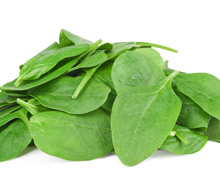
People concerned with developing or maintaining muscle strength may only think about their protein intake but new research shows veggies are important as well. Scientists in Australia say a cup of leafy green vegetables a day is critical for muscle strength.
Muscle function is an indicator of general health and wellbeing and preserving that was a focus of the study. Researchers form Edith Cowan University collaborated with Deakin University's Institute of Physical Activity and Nutrition and the Baker Heart and Diabetes Institute to find those who ate a nitrate-rich diet predominantly from vegetables had better muscle function than their peers. They published their findings in the Journal of Nutrition.
They looked at data from a 12-year period from more than 3,700 Australians and discovered those with the highest nitrate intake had 11-percent stronger legs than those with the lowest intake and were able to walk at speeds four percent faster.
"Our study has shown that diets high in nitrate-rich vegetables may bolster your muscle strength independently of any physical activity," said lead researcher Dr. Marc Sim. "Nevertheless, to optimize muscle function we propose that a balanced diet rich in green leafy vegetables in combination with regular exercise, including weight training, is ideal."
Muscle weakness is correlated to a diminished quality of life resulting from an increased risk of falls and fractures.
"With around one in three Australians aged over 65 suffering a fall each year, it's important to find ways of preventing these events and their potentially serious consequences," said Dr. Sim.
According to Dr. Sim, the greatest health benefits are from nitrate-rich vegetables such as lettuce, spinach and kale. Even though it’s not considered a leafy green vegetable, beetroot is also a good choice.
"We should be eating a variety of vegetables every day, with at least one of those serves being leafy greens to gain a range of positive health benefits for the musculoskeletal and cardiovascular system," Dr. Sim said. "It's also better to eat nitrate-rich vegetables as part of a healthy diet rather than taking supplements. Green leafy vegetables provide a whole range of essential vitamins and minerals critical for health."
This study builds on Dr. Sim’s previous work on nitrate intake and muscle function in older women and complements other Edith Cowan research regarding cardiovascular health and blood vessel health from cruciferous vegetable consumption.
Dr. Sim is hoping to use these findings to promote increased leafy green vegetable consumption while also looking at other health concerns. "We are currently recruiting for the MODEL Study, which examines how knowledge of disease can be used to prompt people in making long-term improvements to their diet and exercise," he said.
